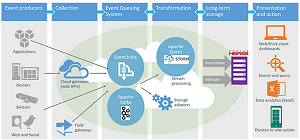Apache Storm Integration Leads Expansion of Azure Data Services
Microsoft today announced Apache Storm technology for real-time Big Data analytics will be integrated with Microsoft Azure, highlighting several expansions of the company's cloud computing platform.
"We're announcing support of real-time analytics for Apache Hadoop in Azure HDInsight and new machine learning capabilities in the Azure Marketplace," said Microsoft exec T.K. Rengarajan in a blog post. "Our partner and Hadoop vendor Hortonworks also announced how they are integrating with Microsoft Azure with the latest release of the Hortonworks Data Platform." Hortonworks Inc., curator of one of the leading Big Data enterprise software distributions, teamed up with Microsoft to develop the HDInsight Hadoop-based service in the Azure cloud.
Storm is an open source, distributed, fault-tolerant real-time computation system, sometimes described as "real-time Hadoop." In addition to real-time analytics, the incubator project stewarded by the Apache Software Foundation can be used for online machine learning; continuous computation; and distributed remote procedure calls (RPC) and extract, transform and load (ETL) jobs, among other use cases described on the project's Web site.
"The preview availability of Storm in HDInsight continues Microsoft's investment in the Hadoop ecosystem and HDInsight," Rengarajan said. "Recently, we announced support for HBase clusters and the availability of HDInsight as the first global Hadoop Big Data service in China. And together with Hortonworks, we continue to contribute code and engineering hours to many Hadoop projects."
 [Click on image for larger view.]Microsoft introduced Apache Storm for real-time analytics for Hadoop.
[Click on image for larger view.]Microsoft introduced Apache Storm for real-time analytics for Hadoop.
(source: Microsoft)
Also available in preview is Microsoft Azure Machine Learning, designed to help customers develop and manage predictive analytics projects. Use case examples for machine learning include search engines, online recommendations for products, credit card fraud prevention systems, traffic directions via GPS and mobile phone personal assistants.
"Today, we are introducing new machine learning capabilities in the Azure Marketplace enabling customers and partners to access machine learning capabilities as Web services," Rengarajan said. "These include a recommendation engine for adding product recommendations to a Web site, an anomaly detection service for predictive maintenance or fraud detection and a set of R packages, a popular programming language used by data scientists. These new capabilities will be available as finished examples for anyone to try."
The Microsoft exec also announced that the Hortonworks Data Platform (HDP) from its partner has achieved Azure certification, noting that the Hadoop vendor will include hybrid data connectors in the next HDP release to enable customers to extend on-premises deployments of Hadoop to Azure for easier backup, scaling and testing.
Posted by David Ramel on 10/15/2014